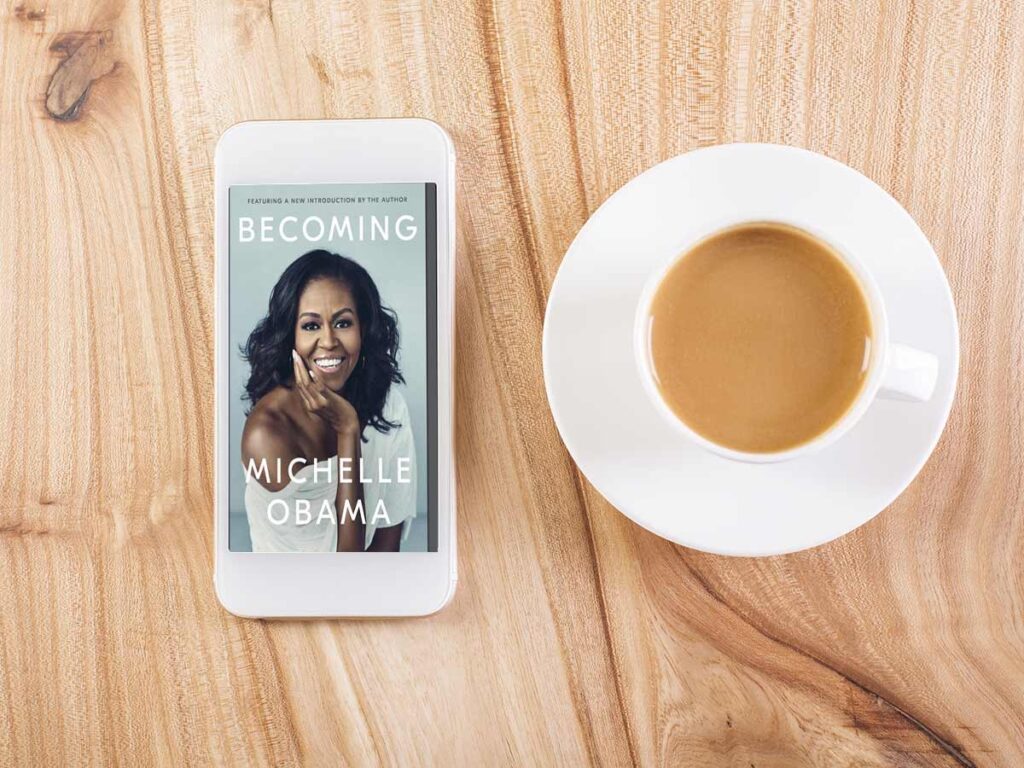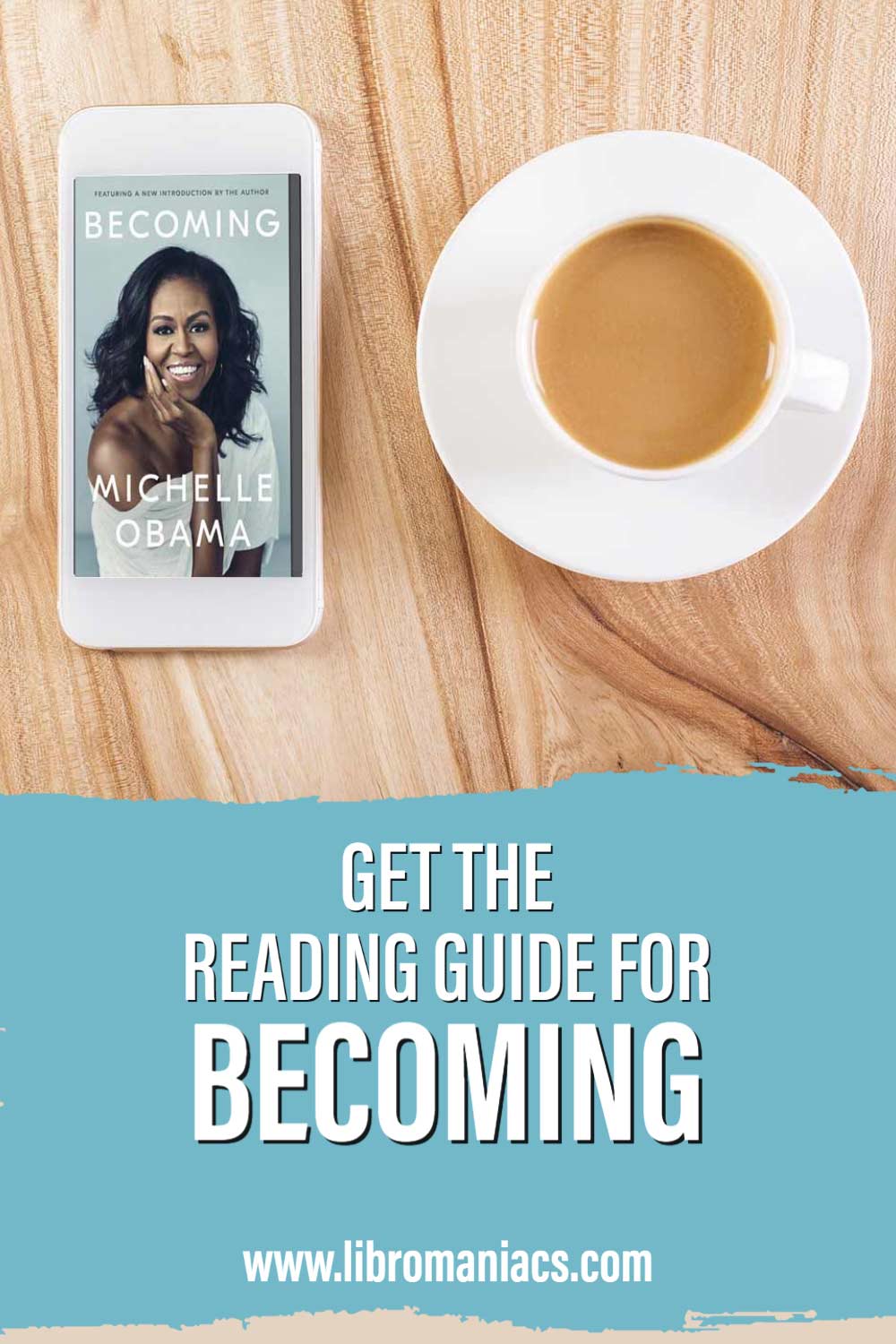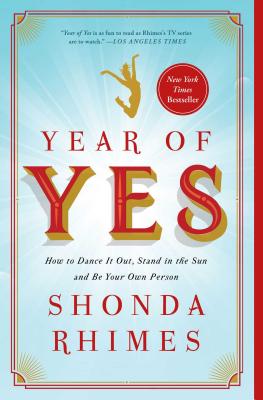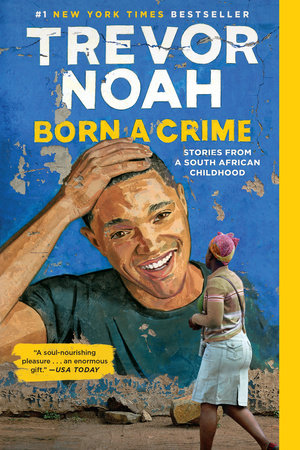In her book Becoming, Michelle Obama opens the door for readers to look at her life from childhood through her years at the White House.
This memoir is a personal and reflective piece that tackles the hardships and victories of a young Black girl living in Chicago and the remarkable journey that took her to the most famous house in the United States. The book covers a lot of themes from identity to race to politics to American society, and our book club questions for Becoming will help you delve into these big themes.
Obama’s voice throughout this book (and it is indeed great on audio), is welcoming and thoughtful while staying true to her ideals and history. Her experience is one that few people ever live through, and the opportunity to see behind the curtain is fascinating.

In this Becoming discussion guide, we’ll help your group look at this experience in several ways, with selected reviews from other readers, a clear synopsis, and 10 Becoming book club questions.
If you want to read more books that address other important themes relevant in today’s society told through informative and thoughtful voices, we have also provided a list of three books like Becoming.
(This article contains affiliate links. This means that if you choose to purchase, I’ll make a small commission.)
Becoming Synopsis
Becoming, Michelle Obama
In a life filled with meaning and accomplishment, Michelle Obama has emerged as one of the most iconic and compelling women of our era. As First Lady of the United States of America—the first African American to serve in that role—she helped create the most welcoming and inclusive White House in history, while also establishing herself as a powerful advocate for women and girls in the U.S. and around the world, dramatically changing the ways that families pursue healthier and more active lives, and standing with her husband as he led America through some of its most harrowing moments.
Along the way, she showed us a few dance moves, crushed Carpool Karaoke, and raised two down-to-earth daughters under an unforgiving media glare.
In her memoir, a work of deep reflection and mesmerizing storytelling, Michelle Obama invites readers into her world, chronicling the experiences that have shaped her—from her childhood on the South Side of Chicago to her years as an executive balancing the demands of motherhood and work, to her time spent at the world’s most famous address.
With unerring honesty and lively wit, she describes her triumphs and her disappointments, both public and private, telling her full story as she has lived it—in her own words and on her own terms. Warm, wise, and revelatory, Becoming is the deeply personal reckoning of a woman of soul and substance who has steadily defied expectations—and whose story inspires us to do the same.
Becoming Book Club Questions
- Michelle Obama talks a lot about how her parents spoke to she and her brother like adults. They encouraged asking questions and allowed their children to explore the world while creating a safe space at home. Michelle was allowed to question the adults in her life and come to her own opinions.
How did this upbringing affect the way she approached the world throughout the rest of the book? - While her story is extraordinary because she has experienced what only a select number of people will ever have, her childhood was a relatively normal one. Did you relate to parts of Obama’s upbringing in the 1970s? In what ways?
- “What would happen to all the kids who had been left in the basement with the teacher who couldn’t teach?”
Michelle Obama talks about this life-changing moment when her mother helped move her into a classroom where she would be challenged and excel in school. Still, she gives a moment to reflect on what this means for children who didn’t have this opportunity.
Did you see other moments where Obama checks her privileges throughout the book? How did these moments affect her values and the causes she supports? - Obama gives her readers a close look at life in the White House, specifically as the First Lady. Was there anything that surprised you about this experience? Something you had just never thought about before?
- In the book, Obama provides photographs ranging from her childhood to her time in the White House. These photos show a range of White House moments, from the wonderfully mundane to the extraordinary. How did this personal look into the life of the presidential family make you feel? Did you have a favorite photo?
- Obama writes about how she supported her husband’s decision to run. Still, the reality of this victory was a massive change for their family that came with several levels of pressure, both as the First Family and as the first First Family of color.
On top of their new roles, the Obamas were also still parents. Sacha and Malia were seven and ten years old when they moved into the White House. In what ways did you notice the Obamas trying to retain a sense of normalcy for their children? What would you have done in this position? - “Why Becoming? We actually had a blooper list of titles that we won’t go into here. But Becoming just summed it all up. A question that adults ask kids—I think it’s the worst question in the world—is ‘What do you want to be when you grow up?’ As if growing up is finite. As if you become something and that is all there is.” (from an Oprah Daily interview.)
What did you think of the title “Becoming”? What other titles do you think would work for this book? - “I’ve smiled for photos with people who call my husband horrible names on national television, but still want a framed keepsake for their mantel.”
Michelle Obama speaks to how the media portrayed she and her husband while Barak Obama was running for President and during his time in the White House. Did reading her perspective make you think differently about stories you had heard in the media? Why or why not? - Throughout the book, Obama talks a lot about the causes she chose to focus on as the First Lady and why they were important to her. If you were to put yourself in her shoes as the First Lady/Gentleman of the United States, what causes would you like to put your energy and power towards?
- In many ways, 2018 was not that long ago, but since this book was published, the USA and the world have undergone many changes with two administrations since the Obamas were in office. We’ve had a global pandemic, and the Black Lives Matter movement, just to name a two.
How do you see this book in the context of the time you are reading it vs. the time it was written?
Selected Reviews for Becoming
“This is not really a book about politics, though political experiences obviously do come into it. It’s a shame that some will dismiss this book because of a difference in political opinion, when it is really about a woman’s life.”
“I loved that rather than a rehashed Wiki article of her successes, this was a reflective coming-of-age story that will be inspiring to so many women and people of color who are struggling to find themselves…her perspective is valuable and very much needed.”
“The issue, to me, was that it felt more like a biography than an autobiography. A lot of how: facts, anecdotes, memories, but not a lot of why: analysis, opinions…maybe it was a little to polished? A little too clean? Even when she talked about anger, it felt like “light anger”, like okay anger. Even when she talked about marriage issues or about the death of her friend at a young age, it felt like she had a lot of distance, like she talked about someone’s else life…”
“…even with this coziness, Becoming never shies away from the uncomfortable realities of what it means to be a Black woman in America, and more specifically what it means to be the first Black First Lady of America.”
Three Books Like Becoming
Memoirs can be a powerful way for someone with a unique or important experience to share their story. If reading this book was meaningful to you or illuminated a light on a topic you didn’t know much about before, consider reading these other powerful memoirs by inspiring and influential voices.
In addition, Becoming was an Oprah pic and you can peruse our other Oprah discussion guides for more ideas, which includes books like An American Marriage and Between the World and Me.
Year of Yes, by Shonda Rhimes
Rhimes is the creative genius behind hit TV shows like Grey’s Anatomy, Scandal and How to Get Away with Murder. It’s easy to say “no” when you are running hit TV shows and have kids at home. But when her sister told her that she never says yes to anything, Rhimes was shaken out of her complacency. This memoir follows her as she busts out of her introverted comfort zone and says yes to far more than she ever thought she would.
This shares some similar theme with Becoming, most notably, a willingness to dive into the deep end of the pool. Rhimes gives a great audio performance and we’ve featured this memoir (and Born a Crime) on our list of great memoirs on audio.
Born a Crime, Trevor Noah
When most people hear Trevor Noah’s name, they think of him as a comedian or Daily Show host, but his story began with a criminal act. Trevor’s birth was considered illegal in South Africa because his father was White while his mother was Black.
Noah uses this book to share his own story while giving readers the context around apartheid and how Jim Crow America inspired the system. He uses his comedic voice to engage and connect with the reader while discussing the serious topics of race and class.
The Glass Castle, Jeannette Walls
To be clear, Obama’s family was not like Walls’ family. This is not your cozy, “my parents totally supported me” kind of story.
Walls grew up in a nonconformist family and lived with her parents and three siblings as nomads. The dynamics between Walls and her family are complicated. There was the struggle which often that left she and her siblings to fend for themselves. But Walls also describes her parents’ passion, imagination, and kindness.
This is a story of family, with all of its flaws, and how Jeanette found her own sense of self and success.
Share these Becoming book club questions with your friends:





